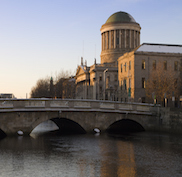Is Ireland perceived to be more corrupt than many of its neighbours and EU-counterparts?

An index released recently by Transparency International, which marks its 25th anniversary this year, has ranked Ireland 19th out of 183 states on the leading international measure of corruption.
The index, which ranks 180 countries and territories by their perceived levels of public sector corruption according to experts and businesspeople, uses a scale of zero to 100, where zero is highly corrupt and 100 is very clean. This year, the index found that more than two-thirds of countries score below 50, with an average score of 43.
Ireland gained a single point from its score last year, increasing from 73 to 74 points, but in terms of statistical significance, Transparency International Ireland stated that there are no grounds for concluding that there has been any notable change in the perception of corruption in Ireland between 2016 and 2017.
With its 19th place ranking, Ireland is perceived to be more corrupt than many of its neighbours and EU-counterparts, such as Denmark, Norway, Sweden and the UK, which all rank in the top ten. As a result there has been a call by TI Ireland to ‘commit more resources, strengthen legislation and ensure adequate enforcement of the framework of laws in Ireland that help prevent corruption’.
TI Ireland has again highlighted a recent Eurobarometer Business and Corruption study that suggests that impunity remains a particularly important issue in Ireland. Fifty-five percent of those polled in Ireland found it ‘totally unlikely’ that ‘businesses engaging in corrupt practices would be heavily fined or imprisoned by a court’, and 49% found it totally unlikely that ‘they would be caught or reported to the police or prosecutors’.
In reality, acts which are deemed to be considered corruption can be subjective and difficult for organisations and individuals to combat without adequate training and support. If you believe you or your organisation could be at risk of allegations of corruption, do not hesitate to contact our specialist team of lawyers who will provide the expert legal advice and support that you may require.
